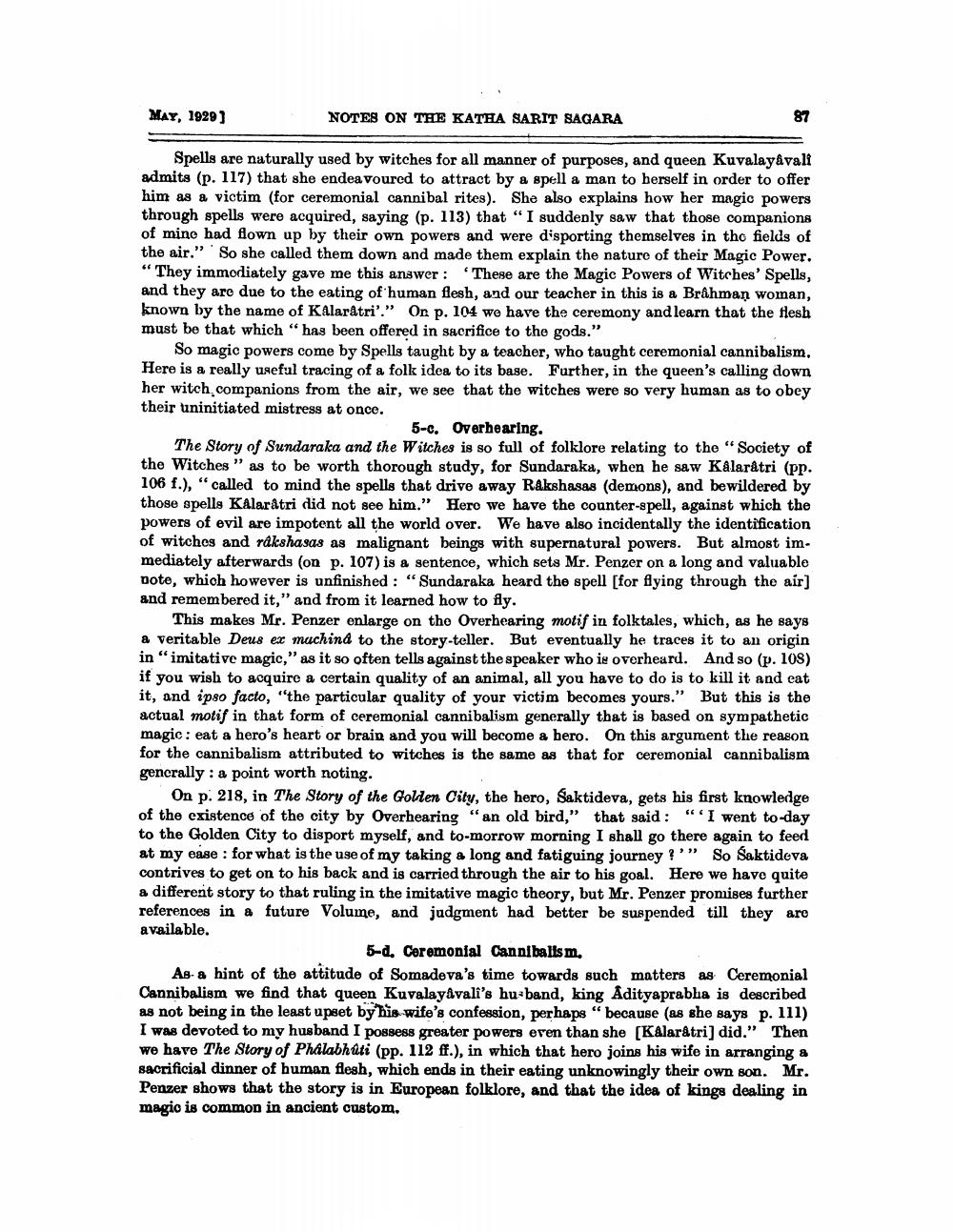________________
MAY, 1929)
NOTES ON THE KATHA SARIT SAGARA
Spells are naturally used by witches for all manner of purposes, and queen Kuvalayavali admits (p. 117) that she endeavoured to attract by a spell a man to herself in order to offer him as a victim (for ceremonial cannibal rites). She also explains how her magic powers through spells were acquired, saying (p. 113) that "I suddenly saw that those companions of mine had flown up by their own powers and were disporting themselves in the fields of the air." So she called them down and made them explain the nature of their Magic Power, "They immediately gave me this answer: These are the Magic Powers of Witches' Spells, and they are due to the eating of human flesh, and our teacher in this is a Brahman woman, known by the name of KAlaratri'." On p. 104 we have the ceremony and learn that the flesh must be that which has been offered in sacrifice to the gods."
So magic powers come by Spells taught by a teacher, who taught ceremonial cannibalism. Here is a really useful tracing of a folk idea to its base. Further, in the queen's calling down her witch companions from the air, we see that the witches were so very human as to obey their uninitiated mistress at once.
5-c. Overhearing. The Story of Sundaraka and the Witches is so full of folklore relating to the "Society of the Witches” as to be worth thorough study, for Sundaraka, when he saw Kâlarâtri (pp. 106 f.), "called to mind the spells that drive away Rakshasas (demons), and bewildered by those spells KAlaratri did not see him.” Here we have the counter-spell, against which the powers of evil are impotent all the world over. We have also incidentally the identification of witches and rakshasas as malignant beings with supernatural powers. But almost immediately afterwards (on p. 107) is a sentence, which sets Mr. Penzer on a long and valuable note, which however is unfinished : "Sundaraka heard the spell [for flying through the air] and remembered it," and from it learned how to fly.
This makes Mr. Penzer enlarge on the Overhearing motif in folktales, which, as he says a veritable Deus ex machind to the story-teller. But eventually he traces it to an origin in "imitative magic," as it so often tells against the speaker who is overheard. And so (p. 108) if you wish to acquire a certain quality of an animal, all you have to do is to kill it and eat it, and ipso facto, "the particular quality of your victim becomes yours." But this is the actual motif in that form of ceremonial cannibalism generally that is based on sympathetic magic: eat a hero's heart or brain and you will become a bero. On this argument the reason for the cannibalism attributed to witches is the same as that for ceremonial cannibalism gencrally: a point worth noting.
On p. 218, in The Story of the Golden City, the hero, Saktideva, gets his first knowledge of the existence of the city by Overhearing "an old bird," that said: “I went to day to the Golden City to disport myself, and to-morrow morning I shall go there again to feed at my ease : for what is the use of my taking a long and fatiguing journey?'” So Saktideva contrives to get on to his back and is carried through the air to his goal. Here we have quite a different story to that ruling in the imitative magic theory, but Mr. Penzer promises further references in a future Volume, and judgment had better be suspended till they are available.
5-d. Ceremonial Cannibalism. As a hint of the attitude of Somadeva's time towards such matters as Ceremonial Cannibalism we find that queen Kuvalayavali's hu-band, king Adityaprabha is described as not being in the least upset by his wife's confession, perhaps“ because (as she says p. 111) I was devoted to my husband I possess greater powers even than she [KAlar&tri) did." Then we have The Story of Phalabhati (pp. 112 ff.), in which that hero joins his wife in arranging & sacrificial dinner of human flesh, which ends in their eating unknowingly their own son. Mr. Penzer shows that the story is in European folklore, and that the idea of kings dealing in magic is common in ancient custom.




